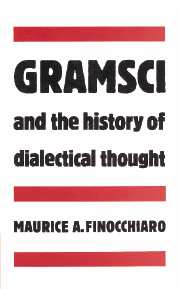Book contents
- Frontmatter
- Contents
- Preface and acknowledgments
- INTRODUCTION: AN APPROACH TO GRAMSCI
- Chapter 1 GRAMSCI'S CROCEAN CRITIQUE OF CROCE'S PHILOSOPHY
- Chapter 2 CROCE AND THE THEORY AND PRACTICE OF CRITICISM
- Chapter 3 GRAMSCI'S METHODOLOGICAL CRITICISM OF BUKHARIN'S SOCIOLOGY
- Chapter 4 BUKHARIN AND THE THEORY AND PRACTICE OF SCIENCE
- Chapter 5 GRAMSCI'S DIALECTICAL INTERPRETATION OF MACHIAVELLI'S POLITICS
- Chapter 6 GRAMSCI'S POLITICAL TRANSLATION OF HEGELIAN-MARXIAN DIALECTIC
- Chapter 7 HEGEL AND THE THEORY AND PRACTICE OF DIALECTIC
- Chapter 8 GRAMSCI AND THE EVALUATION OF MARXISM
- CONCLUSION: DIALECTICAL METHODOLOGY AND TEXTUAL CRITICISM
- Appendix: Concordance of critical edition and English translations
- Notes
- Bibliography
- Index
Chapter 3 - GRAMSCI'S METHODOLOGICAL CRITICISM OF BUKHARIN'S SOCIOLOGY
Published online by Cambridge University Press: 10 December 2009
- Frontmatter
- Contents
- Preface and acknowledgments
- INTRODUCTION: AN APPROACH TO GRAMSCI
- Chapter 1 GRAMSCI'S CROCEAN CRITIQUE OF CROCE'S PHILOSOPHY
- Chapter 2 CROCE AND THE THEORY AND PRACTICE OF CRITICISM
- Chapter 3 GRAMSCI'S METHODOLOGICAL CRITICISM OF BUKHARIN'S SOCIOLOGY
- Chapter 4 BUKHARIN AND THE THEORY AND PRACTICE OF SCIENCE
- Chapter 5 GRAMSCI'S DIALECTICAL INTERPRETATION OF MACHIAVELLI'S POLITICS
- Chapter 6 GRAMSCI'S POLITICAL TRANSLATION OF HEGELIAN-MARXIAN DIALECTIC
- Chapter 7 HEGEL AND THE THEORY AND PRACTICE OF DIALECTIC
- Chapter 8 GRAMSCI AND THE EVALUATION OF MARXISM
- CONCLUSION: DIALECTICAL METHODOLOGY AND TEXTUAL CRITICISM
- Appendix: Concordance of critical edition and English translations
- Notes
- Bibliography
- Index
Summary
My interpretative program for Gramsci's Prison Notebooks calls for an elucidatory systematization and a critical evaluation of those notes containing explicit critiques of Croce, Bukharin, and Machiavelli, and implicit discussions of the questions of the status of Marxism as a religion, a science, and politics, respectively. I first systematized the Crocean notes by reconstructing them as defending the religious and philosophical dimensions of Marxism from Croce's liquidationist dismissal. In the preceding chapter I documented my evaluation of Gramsci's argument as soundly rooted in Crocean principles and critical methodology. Continuing with Gramsci's felt need to place himself from a dialogical, polemical point of view, and with my own theme of the foundations of Marxist criticism, I now turn to Gramsci's critique of Bukharin and the problem of the status of Marxism as a science.
Gramsci's critique of Bukharin's sociology has usually been studied from a historical point of view. It has often been seen as an important document for understanding the relationship between Gramsci's Marxism and the Third International. For example, some have argued that the critique is symptomatic of the emerging contrast between the older Bolshevism and the increasingly official Marxism-Leninism, while others have attributed to it a formative function in the development of Gramsci's own philosophy of praxis. More recently, it has been taken by some as evidence that Gramsci belongs to the tradition of Western Marxism, while others have suggested that his philosophical critique is compatible with a deeper similarity of political outlook with Bukharin.
- Type
- Chapter
- Information
- Gramsci and the History of Dialectical Thought , pp. 68 - 93Publisher: Cambridge University PressPrint publication year: 1989

